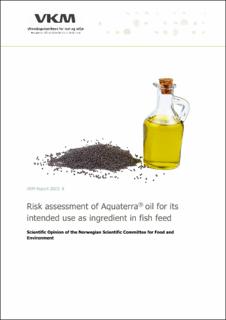Risk assessment of Aquaterra® oil for its intended use as ingredient in fish feed. Scientific Opinion of the Norwegian Scientific Committee for Food and Environment
Thorstensen, Tage; Bodin, Johanna Eva; Duale, Nur; Jevnaker, Anne-Marthe Ganes; Johansen, Johan; Sipinen, Ville Erling; Shapaval, Volha; Sæle, Øystein; Prydz, Kristian; Skjærven, Kaja Helvik
Journal article, Peer reviewed
Published version
Permanent lenke
https://hdl.handle.net/11250/3109223Utgivelsesdato
2023Metadata
Vis full innførselSamlinger
Originalversjon
VKM Report. 2023, 2023 (8), 1-58.Sammendrag
The Norwegian Scientific Committee for food an Environment (VKM) has assessed an application for authorisation of refined oilseed rape oil (Aquaterra®) derived from genetically modified oilseed rape line NS-B50027-4 for exclusive use as an ingredient in fish feed in Norway. NS-B50027-4 is also named DHA-canola. This report uses the term oilseed rape. NS-B50027-4 produces omega-3 long-chain (≥C20) polyunsaturated fatty acids (omega-3 LC-PUFAs) in its seeds, with a high level of docosahexaenoic acid (DHA) and a small amount of eicosapentaenoic acid (EPA) and docosapentaenoic acid (DPA). Aquaterra® also contains a significant level of alpha-Linolenic acid (ALA). Whereas ALA can be derived from plants, the primary producers of EPA and DHA are mainly marine microalgae. EPA and DHA are concentrated in the food chain to fish in the oceans and are often referred to as marine omega-3 fatty acids. NS-B50027-4 was developed as an alternative land-based source of marine fatty acids, mainly DHA. NS-B50027-4 was genetically modified to express seven transgenes derived from yeasts and marine microalgae that encode the enzymes necessary for the biosynthesis of omega-3 long chain polyunsaturated fatty acids. In addition, an eighth gene, pat, was inserted as a marker for selection purposes during development. The pat gene encodes the enzyme phosphinothricin N-acetyltransferase (PAT) conferring tolerance to glufosinate-ammonium herbicides. Equally to conventional refined oilseed rape oils any residues levels of proteins, including the introduced enzymes, will be negligible in the Aquaterra® oil. The risk assessment of Aquaterra® was conducted in accordance with the guidance for risk assessment of derived food and feed from genetically modified plants as described by the European Food Safety Authority (EFSA, 2011a). The risk assessment is based primarily on scientific documentation provided in the application EFSA-GMO-NL-2019-160, which seeks approval for NS-B50027-4 for all applicable food and feed uses in the European Union (EU). VKM concludes that the provided scientific documentation fulfills the criteria of the EFSA guidance and is adequate for risk assessment. VKM concludes that the molecular characterisation, comparative, nutritional, toxicological and allergenicity assessments of NS-B50027-4 do not indicate increased risks to animal or human health compared to its conventional counterpart (comparator) or commercial reference varieties. Based on this together with specific analyses of the seed oil fraction and studies, e.g., in fish, VKM therefore concludes that the refined oil Aquaterra®, is equal to conventional oils from oilseed rape except for the altered composition in fatty acids. VKM concludes there is no increased health risk to fish fed Aquaterra® in feed compared to conventional feeds with oils from other sources, nor is there an indication of increased risk to the environment. Since Aquaterra® is equal to conventional oils from oilseed rape except for the marine omega-3 fatty acids already present in fish feeds, VKM concludes there is no greater need for health or environmental monitoring of feeds containing Aquaterra® than conventional feeds. Risk assessment of Aquaterra® oil for its intended use as ingredient in fish feed. Scientific Opinion of the Norwegian Scientific Committee for Food and Environment
